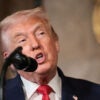There is a major misconception in the United States concerning the balance of trade and jobs. Many equate trade deficits and increases in imports as bad for employment. They could not be more wrong. In fact, higher imports are a signal of prosperity and plentiful jobs. When a country’s economy is growing, more jobs are created, and people have more money to spend on goods—including imports.
Another major problem relates to how the trade deficit is measured. A cell phone assembled in China and sold in the United States, for instance, counts as a Chinese export. Yet, while only the manual assembly labor is conducted in China, the balance of trade calculation credits China for the entire price of the cell phone, thereby overstating the size of the trade deficit.
Instead of being the world leader in the assembly of electronic devices, the U.S. leads with high-quality, high-paying jobs that focus on the creation of intellectual property, product design, and financing. These types of jobs provide more value to America’s economy, but receive no credit in the balance of trade calculation.
Protectionists argue that imports and trade deficits destroy jobs. This belief could not be more foolish.
Drew Ringley is currently a member of the Young Leaders Program at The Heritage Foundation. For more information on interning at Heritage, please click here.
































